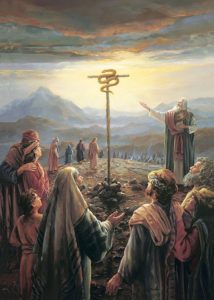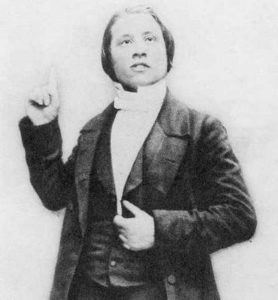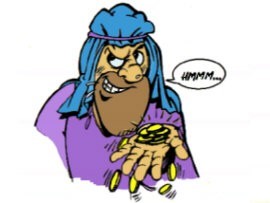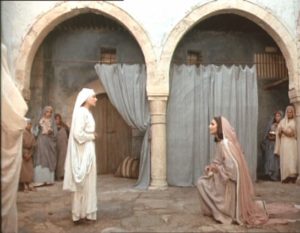THE END OF THE WANDERING GENERATION; GOD IS NOT MANIPULATED; THE MAGNIFICAT
OLD TESTAMENT READING: NUMBERS 21-22:20; THE END OF “THE WANDERING GENERATION”
THE SERPENT OF BRASS
Instead of taking God at His word and trusting Him for victory over the descendants of Esau, the Edomites, the Israelites “turn away” and go south eventually passing to the east side of the Dead Sea.
The people become impatient with God and Moses and murmur against them. The LORD sends chastisement— fiery serpents whose poisonous bites infect them with a terminal illness. This death sentence provokes repentance to the degree that the people come to Moses and acknowledge their sin. They ask Moses to intercede for their deliverance.
8 Then the LORD said to Moses, “Make a fiery serpent, and set it on a standard; and it shall come about, that everyone who is bitten, when he looks at it, he will live.” 9 And Moses made a bronze serpent and set it on the standard; and it came about, that if a serpent bit any man, when he looked to the bronze serpent, he lived. (Numbers 21:8-9; NASB)
Moses is given instruction in these two verses that in the New Testament Jesus will use as a picture of the plan of salvation. In John’s Gospel, chapter 3, He instructs a spiritually curious expert in the Torah named Nicodemus how a person can be born again.
“As Moses lifted up the serpent in the wilderness, even so must the Son of Man be lifted up; 15 so that whoever believes will in Him have eternal life. 16 “For God so loved the world, that He gave His only begotten Son, that whoever believes in Him shall not perish, but have eternal life.” John 3:10-16 (NASB)
We are born again by trusting God’s plan of salvation- Jesus dying on the cross as our substitute. He identifies with sin- the whole problem of sin– stemming back from the source- the serpent who was the liar and murderer from the beginning (1 John 3:8, John 8:44). “He who knew no sin (Jesus), became sin, that we might become the righteousness of God in Him” (2 Cor 5:21).
Moses was not commanded to put a serpent on a pole but ‘a serpent of brass’ upon a standard to be lifted up. (Remember brass is a consistent symbol of judgment in the Old Testament.) What a picture of the cross of Christ!
“For what the Law could not do, weak as it was through the flesh, God did: sending His own Son in the likeness of sinful flesh and as an offering for sin, He condemned sin in the flesh, 4 so that the requirement of the Law might be fulfilled in us, who do not walk according to the flesh but according to the Spirit.” (Romans 8:3-4; NASB)
Those who, in obedience to God’s Word, look to Jesus Christ, are saved from the death sentence incurred by their sin.
The 19th century preacher, Charles Haddon Spurgeon, a mighty instrument in God’s hand, was converted on a snowy day in Colchester, Essex, England. He ducked into a primitive Methodist Chapel on Artillery Street because the snow prevented him from going to his intended destination. There he heard a barely literate layman get up and expound upon Isaiah 45:22 22 “Look unto me, and be ye saved”, (KJV). He used ‘looking to the serpent on the pole’ in Numbers 21 as an illustration.
He began thus: ‘My dear friends, this is a very simple text indeed. It says, “Look.” Now that does not take a deal of effort. It ain’t lifting your foot, or your finger; it is just “look.” Well, a man need not go to college to learn to look. You may be the biggest fool, and yet you can look. A man need not be worth a thousand a year to look. Anyone can look; a child can look. But this is what the text says. Then it says, “Look unto Me.” ‘Ay,’ said he, in broad Essex, ‘many of ye are looking to yourselves. No use looking there. You’ll never find comfort in yourselves.’ Then the good man followed up his text in this way: ‘Look unto Me: I am sweating great drops of blood. Look unto Me; I am hanging on the Cross. Look: I am dead and buried. Look unto Me; I rise again. Look unto Me; I ascend; I am sitting at the Father’s right hand. O, look to Me! Look to Me!’
Spurgeon then describes the moment that changed his life forever:
“Then he looked at me under the gallery, and I daresay, with so few present, he knew me to be a stranger. He then said, ‘Young man, you look very miserable.’ Well, I did; but I had not been accustomed to have remarks made on my personal appearance from the pulpit before. However, it was a good blow struck. He continued: ‘And you will always be miserable — miserable in life and miserable in death — if you do not obey my text. But if you obey now, this moment, you will be saved.’
“Then he shouted, as only a Primitive Methodist can, ‘Young man, look to Jesus Christ.’ There and then the cloud was gone, the darkness had rolled away, and that moment I saw the sun; and I could have risen that moment and sung with the most enthusiastic of them of the Precious Blood of Christ.”
NUMBERS 22- THE LORD IS NOT TO BE MANIPULATED- THE STORY OF BALAAM
Plans to manipulate God will backfire.
In the final chapters of the book we read of Balaam, a pagan prophet. His inclusion in the Bible gives us a strong warning against attempts to manipulate God.
Much time, energy and effort are spent by Balak, the king of Moab (a type of the flesh) to try to manipulate God.
The victories which the Lord granted the children of Israel over King Sihon (of the Amorites) and Og (of Bashan) send fear into the heart of Balak, the king of Moab. He seeks to strategize with Midian to avoid having their natural resources swallowed up by the Israelites traveling through their land.
4 Moab said to the elders of Midian, “Now this horde will lick up all that is around us, as the ox licks up the grass of the field.” Numbers 22:4 (NASB) 
In an effort to curse Israel, King Balak hires the pagan seer Balaam who had an international reputation for supernatural dealings.
Balaam lives at Pethor in northern Syria, some 400 miles north of Moab. First Balak sends messengers on this long expensive trip to solicit Balaam’s help. Balaam gives these flattering dignitaries lodging while he makes inquiry to YAHWEH (the God of the Hebrews) (22:8).
We see many examples of God’s sovereignty in the story of Balaam.
God speaks to whom and through whomever He chooses. He can speak to Abimelech and Laban in a dream (Gen 20:3; 31:24). He can answer a pagan prophet, Balaam, and even speak through his donkey.
God did come to Balaam. Perhaps it was in a dream, as the same expression is used as when God came to Abimelech and Laban:
9 Then God came to Balaam and said, “Who are these men with you?” Numbers 22:9 (NASB)
Like a parent, or good counselor, God often asks questions to someone when they are in the midst of trouble; not because He doesn’t know the answers, but because He wants us to trace our steps and think about our disobedient courses of action. To Adam, He asks “Where are you?” To Cain: “Why are you angry? Why has your countenance fallen? Where is your brother Abel? What have you done?”
God prods us with questions to help us resist temptation or to provoke repentance. In this case, if Balaam attempted to curse Israel, he would be bringing a curse upon himself.
God asks Balaam, “Why are you entertaining these proposals to curse those people whom I have blessed?”
As the Lord said to Abraham: 3 And I will bless those who bless you, And the one who curses you I will curse. And in you all the families of the earth will be blessed.” Genesis 12:3 (NASB)
The LORD says to Balaam:
“Do not go with them; you shall not curse the people, for they are blessed.” (Numbers 22:1; NASB)
This is the revealed will of God. Jesus reminded His disciples that they are to pray according to His revealed will. This revelation might be called God’s sovereign will of His command.
Balaam tells Balak’s delegation that the LORD (YAHWEH) has refused to let him go with them. (He does not tell them why, nor specifically that they are already irrevocably blessed.)
In his heart, Balaam has not shut out temptation completely. When Balak hears that his first delegation was refused, he sends another much more impressive delegation with a more attractive offer, saying, “Let nothing, I beg you, hinder you from coming.” In other words, “Name your price.”
Balaam refuses this delegation’s offer but offers them hospitality, hinting that there was some hope that he could change God’s mind.
19 “Now please, you also stay here tonight, and I will find out what else the LORD will speak to me.” Numbers 22:19 (NASB)
In His infinite mercy, God came to Balaam again at night, and said to him:
“If the men have come to call you, rise up and go with them; but only the word which I speak to you shall you do.” Numbers 22:20 (NASB) 
What are we to make of this? Did God change His mind? His original precept (His will of command) stays the same. But Balaam compromised his obedience, having kept the door open to temptation. God, knowing the bent of Balaam’s heart, sovereignly chooses to use Balaam for His purposes and prove that He is not be manipulated. He therefore implements a strategy for His own choice purposes, a permissive will, His sovereign will of decree, that will work with Balaam’s sinful heart.
In the Bible we see that God in His perfect knowledge works with sinners, those who violate His will, to accomplish His Sovereign will of decree, which will not be thwarted. We saw this with Pharaoh who repeatedly hardened his heart. Only later we discover that God hardened His heart to demonstrate His power and glory. For God works all things after the counsel of His will (Ephesians 1:11).
Jesus said 29 “Are not two sparrows sold for a cent? And yet not one of them will fall to the ground apart from your Father.” (Matthew 10:29; NASB)
35 “All the inhabitants of the earth are accounted as nothing, But He does according to His will in the host of heaven And among the inhabitants of earth; And no one can ward off His hand Or say to Him, ‘What have You done?’ (Daniel 4:35; NASB)
Throughout the Bible we see that God uses people and actions He disapproves of. He sometimes uses in His sovereign will of decree those who are in opposition to His moral will of command. For example, God used the sinfulness of those who put Jesus to death to accomplish His choice purpose of redemption.
22 “Men of Israel, listen to these words: Jesus the Nazarene, a man attested to you by God with miracles and wonders and signs which God performed through Him in your midst, just as you yourselves know— 23 this Man, delivered over by the predetermined plan and foreknowledge of God, you nailed to a cross by the hands of godless men and put Him to death. 24 “But God raised Him up again, putting an end to the agony of death, since it was impossible for Him to be held in its power. Acts 2:22-24 (NASB)
NEW TESTAMENT READING: Luke 1:26-56
The same angel named Gabriel, who brought Messianic prophecies in Daniel 8 and 9, and brought the announcement of John the Baptist’s birth (Luke 1:19) to Zacharias, is sent to Mary in Nazareth. He tells her that she has found favor with God and will be the mother of the Messiah.
Mary submits to the will of God, although it remains a mystery to her how she, being a virgin, and having no relations with a man, could become the mother of the Promised Child. Her faith is exemplary as she responds, “Be it unto me, according to Your Word.” (Luke 1:38)
Gabriel tells Mary that her relative Elizabeth has conceived in her old age, encouraging her that “Nothing will be impossible with God.” (Luke 1:37)
Mary visits Elizabeth and discovers that the situation is as Gabriel told her. Elizabeth hears Mary’s greeting and the prophet-in-utero jumps with joy, filled with the Spirit. Elizabeth calls Mary, “Blessed among women” (not ‘Blessed above women’) and “Blessed is the fruit of your womb!” Elizabeth recognizes Mary, her younger cousin, as the mother of her Lord.
Mary responds to this fulfillment of God’s Word with a song of praise, often referred to by its Latin name, “the Magnificat”
46 And Mary said: “My soul exalts the Lord, 47 And my spirit has rejoiced in God my Savior. Luke 1:46-47 (NASB)
In both Elizabeth’s and Mary’s words, we see that both women personally recognize their need for Jesus as both Lord and Savior.
Reading from Psalms- Psalm 57:1-11.
As in the previous Psalm, David is surrounded by those who would seek to harm him. In this case, it is King Saul and his men. David chooses to put his confidence in God rather than his own devices.
His prayer is that God be glorified in the outcome of his trial.
Psalm 57:5, 11 5 Be exalted, O God, above the heavens; let your glory be over all the earth.
David praises God that he can rest in the knowledge of His mercy and truth. He summons his own soul to worship God:
Psalm 57:8-9 (NIV) 8 Awake, my soul! Awake, harp and lyre! I will awaken the dawn. 9 I will praise you, O Lord, among the nations; I will sing of you among the peoples.
Psalm 57:7 (NIV) 7 My heart is steadfast, O God, my heart is steadfast; I will sing and make music.
READING FROM PROVERBS
Proverbs 11:9-11 (NIV) 9 With his mouth the godless destroys his neighbor, but through knowledge the righteous escape. 10 When the righteous prosper, the city rejoices; when the wicked perish, there are shouts of joy. 11 Through the blessing of the upright a city is exalted, but by the mouth of the wicked it is destroyed.
PRAY FOR THE NATIONS
Botswana
Republic of Botswana
Africa
Geography
Area: 581,730 sq. km
The Kalahari Desert covers 80% of the country. Dry and prone to severe droughts.
Population: 1,977,569
Annual Growth: 1.46%
Capital: Gaborone
Urbanites:61.1%
HDI Rank: 125 of 182 (UN Human Development Reports 2009)
Challenges for Prayer
The Tswana were the first Bantu people in Africa to respond to the gospel; several tribes turned to God in the 19th Century through the LMS from England. Other missions followed. Today, the majority of Tswana are Christian in name. Sadly, there is widespread immorality, drunkenness and a breakdown of the traditional family structure, including a high proportion of illegitimate children. Other less numerous groups resent the Tswana’s socio-political influence in Botswana. Pray for a reversal of the moral decline and for renewal among the Tswana.
Most mainline Protestant churches were established by Western missions in generations past, but now are generally in decline. Some suggest that the mainline churches’ struggles today are a legacy from the early missionaries’ failure to contextualize the gospel to local culture; this has resulted in pervasive nominalism. Both local congregations and denominational structures are affected. Pray for revival among these historic churches.
PRAYER: Eternal God and Father, You are the architect of the ages and superintend over all that occurs in time and space, working all things after the counsel of Your will. We give You our trust. You loved us so much that You gave us a remedy for the fatal wound of our sin. Thank You that we can look to Your Holy Son who died in our place, rose, and ascended to heaven, healing our damnable condition by taking our stripes on the cross! He has made peace and given us peace of mind and heart. This glad news has awakened my heart to pray with the Psalmist: “Be exalted O God, above the heavens! May Your glory be over all the earth! In Jesus’ Name. Amen.
Pastor David
So, naturally, we proclaim Christ! We warn everyone we meet, and we teach everyone we can, all that we know about him, so that, if possible, we may bring every man up to his full maturity in Christ. (Colossians 1:28, J.B. Phillips paraphrase)
New Life Community Church, Concord, MA 10742
www.newlife.org
